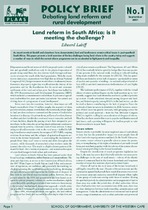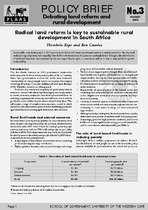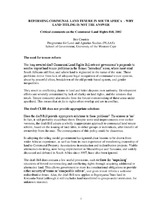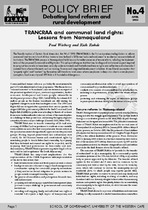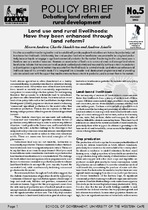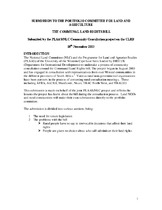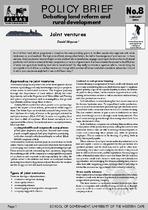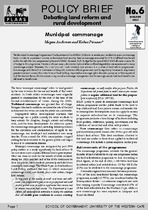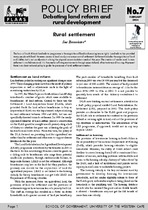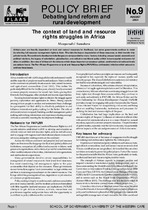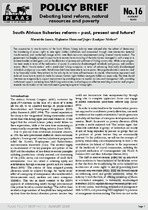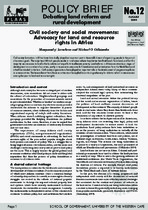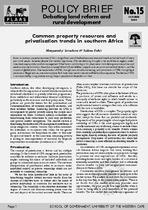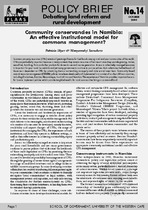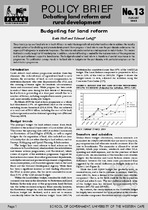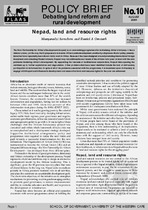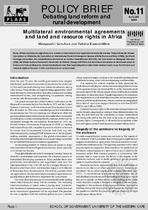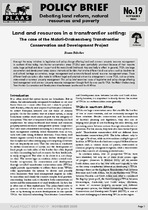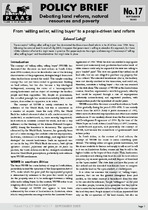Browsing Policy Briefs by Issue Date
Now showing items 1-20 of 144
-
Sustainable development: What's land got to do with it?
(Institute for Poverty, Land and Agrarian Studies, University of the Western Cape, 2001)Ahead of the September 2002 World Summit on Sustainable Development in Johannesburg, South Africa is reviewing its plans and progress towards sustainable development. This paper argues that more attention needs to be given ... -
Land Reform in South Africa: Is it meeting the challenge?
(Institute for Poverty, Land and Agrarian Studies, University of the Western Cape, 2001)As recent events at Brendell and elsewhere have demonstarted, land and landlessness remain critical issues in post-apartheid South Africa. This paper presents a brief overview of the key challenges facing land reform in ... -
Radical land reform is key to sustainable rural development in South Africa
(Institute for Poverty, Land and Agrarian Studies, University of the Western Cape, 2002)Sustainable rural development in 21st century South Africa will never be achieved without a radical assault on the structural underpinnings of poverty and inequality inherited from three centuries of oppression and ... -
Reforming communal land tenure in South Africa – Why land titling is not the answer
(Institute for Poverty, Land and Agrarian Studies, University of the Western Cape, 2002)The long-awaited draft Communal Land Rights Bill sets out government’s proposals to resolve urgent land tenure problems in the former ‘homeland’ areas, where most rural South Africans still live, and where land is ... -
TRANCRAA and communal land rights: Lessons from Namaqualand
(Institute for Poverty, Land and Agrarian Studies, University of the Western Cape, 2003)The Transformation of Certain Rural Areas Act, Act 94 of 1998 (TRANCRAA) is the first comprehensive legislation to reform communal land tenure in South Africa. It aims to transfer land in 23 former coloured rural areas ... -
Land use and rural livelihoods: Have they been enhanced through land reform?
(Institute for Poverty, Land and Agrarian Studies, University of the Western Cape, 2003)It is often assumed that transferring land to rural households will provide people with valuable assets that can be productively used to enhance their livelihoods. Unfortunately, few rural people or land reform beneficiaries ... -
The Communal Land Rights Bill
(Institute for Poverty, Land and Agrarian Studies, University of the Western Cape, 2003)Tenure legislation is urgently necessary. There are serious problem in the communal areas in the ex-homeland provinces. These areas are characterised by severe poverty, overcrowding and isolation from economic growth and ... -
Joint ventures
(Institute for Poverty, Land and Agrarian Studies, University of the Western Cape, 2004)South Africa s land reform programme is based on the state providing grants to landless people who negotiate with white landowners to purchase land. The high price of land, among other factors, has led to the emergence ... -
Municipal commonage
(Institute for Poverty, Land and Agrarian Studies, University of the Western Cape, 2004)The Municipal Commonage Programme of the Department of Land Affairs (DLA) aims to enable poor residents to access commonage lands in order to supplement incomes and enhance food security. New commonage accounted for 31% ... -
Rural settlement
(Institute for Poverty, Land and Agrarian Studies, University of the Western Cape, 2004)The focus of South Africa s land reform programme is the acquisition of land and securing tenure rights. Land reform has provided many people with land. However, access to land is only one component of settlement. Settlement ... -
The context of land and resource rights struggles in Africa
(Institute for Poverty, Land and Agrarian Studies, University of the Western Cape, 2004)Africa’s poor are heavily dependent on land and natural resources for livelihood, but some governments continue to resist transferring full resource management rights to them. This risks the loss or degradation of these ... -
South African fisheries reform – past, present and future?
(Institute for Poverty, Land and Agrarian Studies, University of the Western Cape, 2004)Two approaches to transformation of the South African fishery industry were adopted after the advent of democracy: the broadening of access rights to new rights holders (individuals and companies) through state intervention ... -
Civil society and social movements: Advocacy for land and resource rights in Africa
(Institute for Poverty, Land and Agrarian Studies, University of the Western Cape, 2004)Civil society formations in Africa have historically played an important part in the establishment of organising people in the pursuit of common goals. The majority of Africa’s people reside in rural areas where they ... -
Common property resources and privatisation trends in Southern Africa
(Institute for Poverty, Land and Agrarian Studies, University of the Western Cape, 2004)Access to common property resources (CPRs) is a significant part of the land resource base and therefore the livelihoods of many poor rural people. However, despite their central importance, CPRs are declining throughout ... -
Community conservancies in Namibia: An effective institutional model for commons management?
(Institute for Poverty, Land and Agrarian Studies, University of the Western Cape, 2004)Common property resources (CPRs) remain of great significance for livelihoods among rural and poor communities of the world. CPRs are particularly important because in many contexts they remain resources of last resort ... -
Budgeting for land reform
(Institute for Poverty, Land and Agrarian Studies, University of the Western Cape, 2004)The primary purpose of land reform in South Africa is to redistribute agricultural and other land in order to address the racially skewed pattern of landholding and promote development. Slow progress in land reform over ... -
Nepad, land and resource rights
(Institute for Poverty, Land and Agrarian Studies, University of the Western Cape, 2004)The New Partnership for Africa’s Development (Nepad) is an overarching programme for revitalising Africa’s fortunes. It has a visionary tone, yet the way that it proposes to overcome Africa’s underdevelopment uncritically ... -
Multilateral environmental agreements and land and resource rights in Africa
(Institute for Poverty, Land and Agrarian Studies, University of the Western Cape, 2004)Many African countries are signatories to a number of international and regional environmental treaties. These include the Ramsar Convention on Wetlands, the Convention on International Trade in Endangered Species of Wild ... -
Land and resources in a transfrontier setting
(Institute for Poverty, Land and Agrarian Studies, University of the Western Cape, 2005)Amongst the many initiatives in legislative and policy change affecting land and common property resource management in Southern Africa today, transfrontier conservation areas (TFCAs) seem particularly prominent because ... -
From ‘willing seller, willing buyer’ to a people-driven land reform
(Institute for Poverty, Land and Agrarian Studies, University of the Western Cape, 2005)The concept of ‘willing seller, willing buyer’ has dominated the discourse on land reform in South Africa since 1994. Now, following the national Land Summit of July 2005, it appears that government is willing to abandon ...


